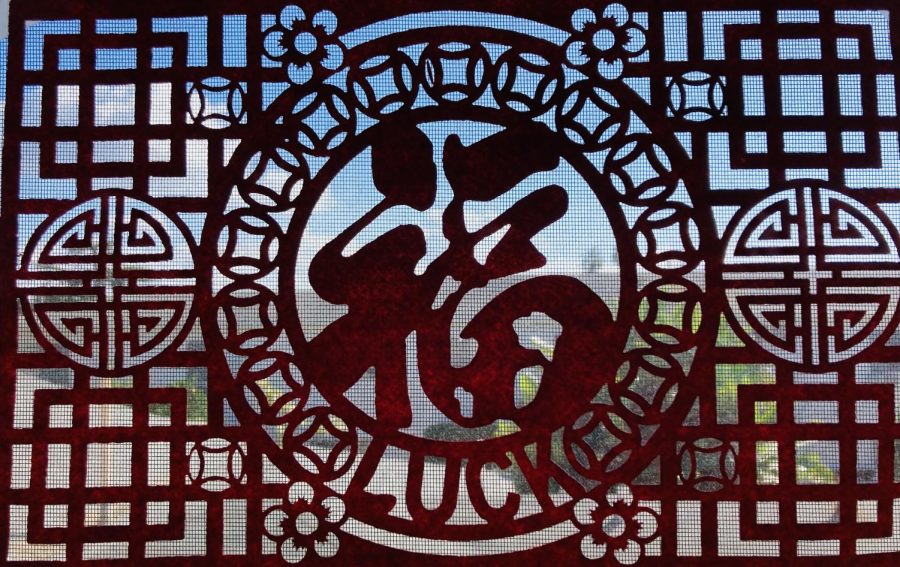New moons, old traditions: students, faculty celebrate Lunar New Year with unique traditions
Photo credit: Melinda Wang
Red felt is cut into elaborate patterns and characters and hung around the house or above doorframes. People who celebrate Lunar New Year hang the felt for good luck, which is shown through the character “fu” (福) because it can mean “good luck” or “prosperity.”
January 29, 2023
Beneath a new moon, families eat niangao, celebrate their ancestors and spend time under one roof. A new moon marks the beginning of Lunar New Year, a holiday meant to celebrate the traditional culture embedded into many countries.
Lunar New Year, a holiday known as chunjie (春节) in Chinese, Tết Nguyên Đán in Vietnamese and Seollal in Korean, is celebrated on the first new moon of the lunar calendar. It is continuously celebrated for 15 days before ending on the first full moon. In Chinese culture, Lunar New Year also marks the start of a new zodiac year. There are 12 animals that correspond to their respective year, and this year is the Year of the Rabbit, which symbolizes longevity, peace and prosperity.
Lunar New Year is often celebrated by setting off fireworks, performing festive dances and making homemade meals. At Archer, faculty, staff and students celebrate Lunar New Year through eating niangao, wearing festive clothing and exchanging hongbao.
Chinese teacher Pei-Ying Gosselin often prepares for the new year before the first new moon has risen. Gosselin said both Lunar New Year’s Eve and Lunar New Year’s Day are filled with events to commemorate the holiday.
“Usually, before the Lunar New Year, we will clean up the whole house. You have things everywhere, [and] you want to make sure that your house is clean before the Lunar New Year starts,” Gosselin said. “Then [on] New Year’s Eve, usually we’ll have a very big meal with our family — the most important family reunion time.”
Natalie Huang (‘25) celebrates Lunar New Year by honoring family and paying homage to the tradition of giving hongbao, which is typically done in East and Southeast Asian cultures. Except, instead of only giving out hongbao, which are red pouches of money adults give children, Huang’s family enjoys playing dice games and gambles with the hongbao money. Huang also said family is an important aspect of the new year and many of her family members live in Taiwan.
“I know a lot of it’s about cleansing, but also it’s the only Chinese holiday that my family celebrates, really,” Huang said. “It’s a time for us to all get together when otherwise we wouldn’t.”
For Gosselin, spending time with family is difficult since they live far apart, even though it’s a common Lunar New Year tradition. However, Gosselin has found ways to connect with her family despite the distance between them.
“Because I’m in America, and all of my family is in Taiwan, I am not able to celebrate the Lunar New Year with my family,” Gosselin said. “That is the saddest part for me, but we usually talk on the phone, so it’s still good.”
Dani Fenster (‘22) identifies as Korean American, and she celebrates the new year, Seollal, with her family. She said celebrating the new year helps bring her closer to her culture.
“It’s really fun to have that tradition we do every single time because I feel that being an Asian American — being half white and half Korean — there’s a lot that I missed out on,” Fenster said. “I feel that this is one of the ways where I really have been able to, without fail, always do this tradition.”
During Lunar New Year, Fenster participates in Korean traditions with her father, and she celebrates by wearing hanbok and bowing to her elders.
“A lot of the stuff that we do is a mix — a kind of Americanized version of different things,” Fenster said. “But it’s really nice also having my dad, who’s fully white, participate and bow and speak Korean.”
Lunar New Year is also often celebrated through food, and specific foods eaten on the holiday that have a cultural significance are egg rolls, steamed fish, jiaozi and niangao, longevity noodles. Gosselin said her favorite new year food is niangao, a sticky rice dessert with a rich background.
“So many New Year’s food[s] symbolize something,” Gosselin said. “One of them is niangao. It’s a sticky rice cake that represents that you’re going to be higher and higher in terms of the status.”
At Archer, the Asian American Pacific Islander Student Union, or APSU, held a Lunar New Year celebration Jan. 27 with a dragon dance, fashion show and Lunar New Year related arts and crafts. As the APSU President, Fenster said she’s learned a lot more about Lunar New Year from students who celebrate the holiday based on their respective backgrounds.
“With Archer’s Lunar New Year celebrations, we integrate a lot of different traditions that I personally haven’t experienced and haven’t participated in,” Fenster said. “I didn’t know that it was as big of a celebration because I knew only what my family did.”









